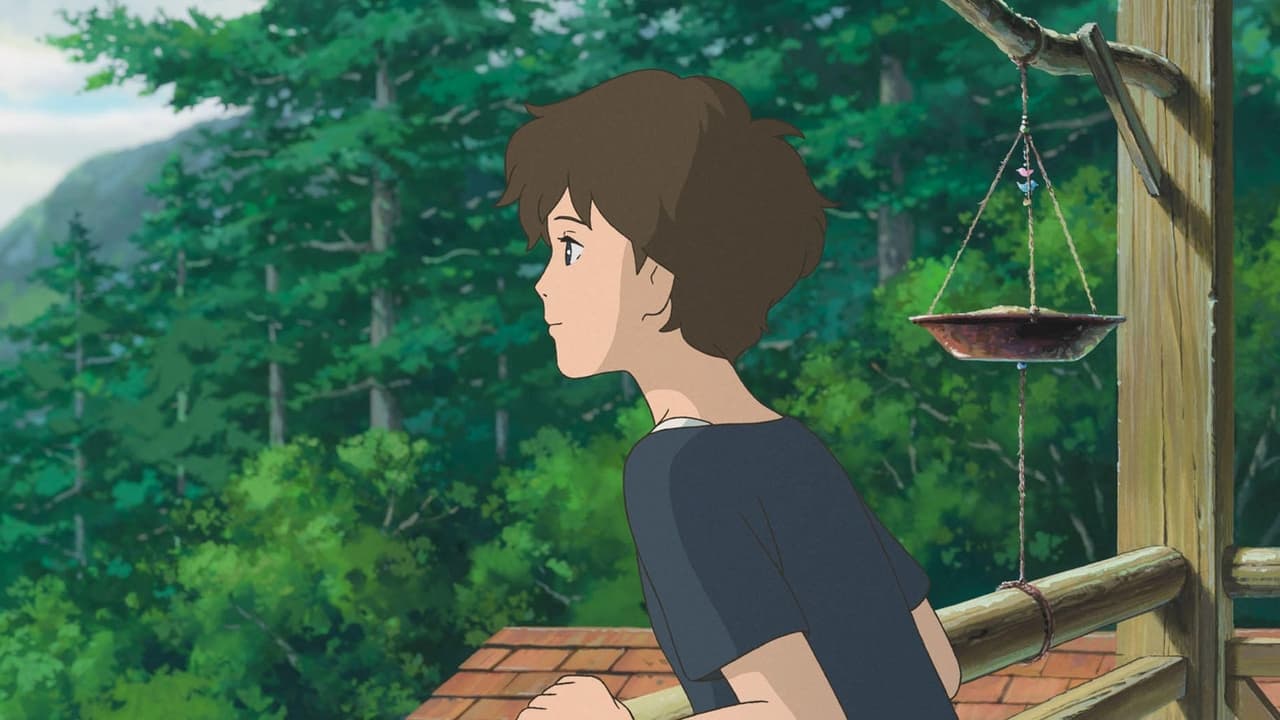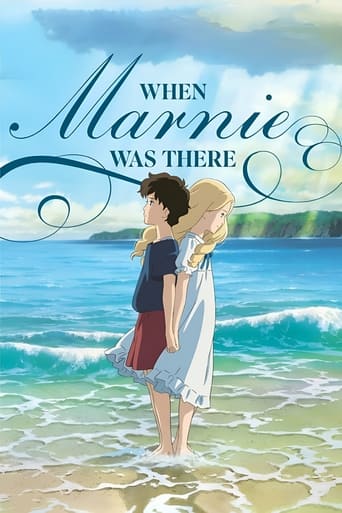

WHEN MARNIE WAS THERE is a sweet and touching family drama from those gifted animators at Studio Ghibli. The story involves a lonely young girl who goes to live with her aunt and becomes entranced by an abandoned old mansion by a lake. She soon befriends a young blonde-haired girl living there and the two develop a friendship, but mystery remains regarding her new friend's identity. As with many recent Ghibli films, this one's set in a recognisable real world and is less fantasy-oriented than their older classics. It's sublimely made, as always, and features a plot which layers on the emotion and feelings until the final, moving twist.
... View MoreThe opening sections of Omoide no Mânî get the film off to a very good start. Primarily this is off the back of how interesting Anna is as a character; she is not amazingly new in her teenage struggles perhaps, but they seem genuine, informed, and they show on her surface in a way that speaks to a lot more happening that is buried. With Anna as the base, the slow pace of the film did not bother me too much because I was interested enough in her to trust the film as it took us to a new community, set-up some interactions and the mystery of the mansion across the swamp.This doesn't last unfortunately, and the film doesn't built on that character so much as sit on the potential. There is a certain engagement in the way the mystery plays out and what Marine leads the film to. However as it goes it asks a lot but doesn't deliver too much; again one goes with this on the trust that it will be something the character deserves. I found it far too neat and tidy when we got there though, and the aspects that Anna indicated early on are sort of simplified more than I liked. It still offers something as it goes, but the destination didn't satisfy.Along the way it is as visually stunning as you expect, and it is as professionally constructed as the norm – but when it moved from an engaging reality into the more fantasy realm I expected it to soar with this as its base, however the pat nature of the conclusion rather grounds it instead.
... View MoreIt's not often I watch a movie then jump straight in to write a review, but this is a rare exception. As a long time Ghibli fan I had been disappointed by their last couple of movies. From the dragging depression and heartbreak of The Wind Rises to the forgettable Up On Poppy Hill, I was hoping When Marnie Was There would break the trend and return to, if not the fantastical magic of Ponyo and Totoro, then at least the sweet satisfaction of the likes of Arietty and Whisper of the Heart. In fact I surfaced from this film wondering if it may just be the most perfect Ghibli of all time. How on Earth can this have lost to Inside Out in the Academy Awards? It's just on another level. Sure it's less fun and cartoony and probably dull for kids to watch, but in terms of artistry, depth of plot, and sheer magic...well, comparing IO to WMWH is like comparing fart jokes to Shakespeare. Not since the first ten minutes of Up have I felt so emotionally drained from watching an animation. And in a good way: the ending doesn't leave you with tears caused by tragedy (Grave of the Fireflies springs to mind) but with those of pure, bittersweet joy. It's a movie that explores the true meaning of love so many ways; friendship, family, fostering and even same-sex relationships. It says more about the uncertain and fearful psyche of a lonely teenager than Inside Out ever could. It is Ghibli's perfect demonstration that one needs to look beyond the superficial, to forgive people for their insecurities and that if you truly care for someone then neither blood, gender or time can or should get in the way. 10/10
... View MoreThe great Hayao Miyazaki has announced his retirement from directing animated films with his Studio Ghibli a number of times, though he has often brought himself back to make just one more film. But now, it is not just the great man himself that is announcing closing for business, it is the Studio as a whole. Directed by one of the younger of six directors to have worked under the Studio Ghibli name, Hiromasa Yonebayashi, 'When Marnie was there' brings an end to three decades worth of anime, starting with 'Laputa: Castle in the Sky'. This film already, therefore, has a lot resting on its shoulders. Yonebayashi has worked on numerous Ghibli films in various animation roles, though his only previous film as a director with the Studio was 'Arrietty': not perhaps their strongest work. Like 'Arrietty' before it - and indeed other Ghibli films - 'When Marnie was there' is based on a British children's novel. The flat, isolated land of Norfolk has been replaced for the mountainous, isolated land of Hokkaido, with young, moody Anna, suffering from asthma, leaves her foster mother in Sapporo to stay with relatives in a small village from some much needed R and R. Troubled at home, Anna's troubles don't particularly ease, failing to fit in, lost in her imagination and sketch pad. Quickly she becomes fascinated by the 'Marsh House', an old mansion left in a state of disrepair. Becoming an obsession, she begins to imagine Marnie, the former daughter of the house many moons ago. Forming a bond with her imaginary companion, Anna begins to come to terms with her own situation at home.The film can be divided into three distinct sections for me: To start, as ever with a Ghibli film, the attention to detail is impeccable, with every pixel of the screen thoughtfully considered, making the animation as true to life as possible. It's once we move toward the film's middle that the level of visual detail starts to decrease a little as the storyline develops. This is where we hit the film's weakest point. As it's a Ghibli film, many might see this as magical and moving in a coming-of-age tale, though for me 'When Marnie was there' gets far too soppy, borderline lesbian and a little bit of a bore. Luckily, as the film draws to a conclusion, it is rescued somewhat as the storyline is rounded off.Up until the new millennium and 'Spirited Away', the direction of Ghibli films was tackled by-and-large by founders Hayao Miyazaki and Isao Takahata. Since then, however, younger directors have, at times, taken the reigns, leaving the films, while on the whole satisfying, a little more bumpy and inconsistent.But with the two founders now both old men, well deserving of the title 'retired', rather than letting the Studio slip into the hands of others, perhaps calling it a day is called for.politic1983.blogspot.co.uk
... View More